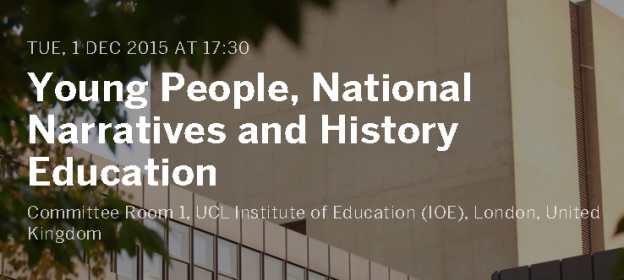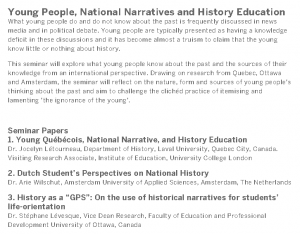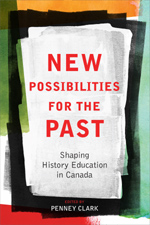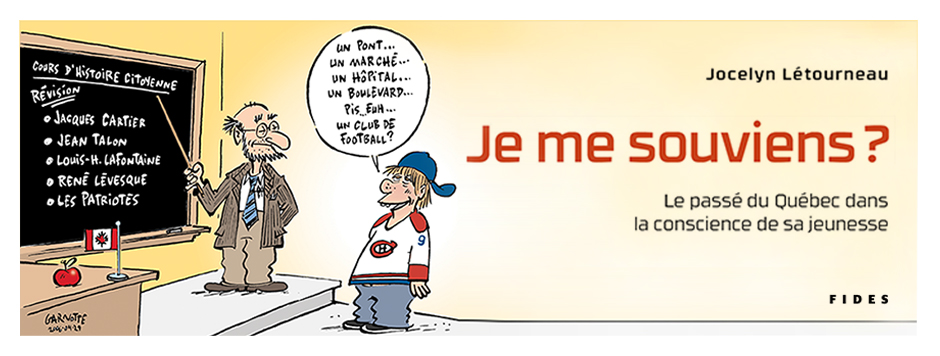Tag Archives: History Education

When entering school, kids are not empty pots. They know many things, including things about the past of their society. Getting into the body of this historical knowledge is an interesting business. It reveals to what extent assimilated family souvenirs and community memories and templates are important in shaping children’s historical knowledge and historical consciousness.
If family souvenirs and community memories are structural components in kid’s historical consciousness, they also represent limitations to take students out of the mythistories – a mix of brute facts and historical romance – they’re trapped in when telling the past. One of the main challenges to teaching the past to kids is to get them outside the thinkable they’ve been accustomed to in living in a particular society and being subjected to its broad representations.
The aim of the talk is to discuss a pragmatic approach to teaching the past to kids in the context of a strong presence of community memories and templates everywhere in society, assuming the fact that kids learn history in and out of the classroom. The proposed approach – to start from memory in order to get out of it – comes from an innovative study effectuated in Quebec in the last decade (www.tonhistoireduquebec.ca) which consisted in collecting short narratives (N = 5000) and phrases (N= 3423) produced by students responding to two basic questions: 1) “Tell me the story of Quebec as you know it;” 2) “If you had to summarize in one sentence the historical experience of Quebec, what would you write personally?”

Young People, National Narratives and History Education
What young people do and do not know about the past is frequently discussed in news media and in political debate. Young people are typically presented as having a knowledge deficit in these discussions and it has become almost a truism to claim that the young know little or nothing about history.
This seminar will explore what young people know about the past and the sources of their knowledge from an international perspective. Drawing on research from Quebec, Ottawa and Amsterdam, the seminar will reflect on the nature, form and sources of young people’s thinking about the past and aim to challenge the clichéd practice of itemising and lamenting ‘the ignorance of the young’.
Dans: Articles

From the HERMES website.
REMEMBERING AUSTRALIA’S PAST
Project Description:
This project aims to explore what pre-service History teachers know, understand, and believe is important about Australia’s past. Australia has experienced two decades of public struggle over the national narrative; concerns over whose history is being taught in schools; reports that teachers and school students find Australian history of little interest; and anxieties over what the public knows about the nation’s past. Much of the concern has been driven by survey research that expects an encyclopaedic knowledge of the past. Using an open-ended narrative methodology, this study seeks to find out what participants do know and imagine about the nation’s past when given the opportunity to tell Australia’s history in their own words. The project draws upon a generative research methodology developed by Professor Jocelyn Létourneau (2006) and used over the past decade to investigate the historical consciousness of over 4,000 young French Canadians [See www.tonhistoireduquebec.ca for more details on the Canadian work that inspired our project]. Pioneered in Québec, the methodology has been appropriated by numerous scholars throughout Europe. Létourneau’s method involved approaching a room of participants with the invitation to “Please present or account for the history of Québec since the beginning, the way you see it, remember it, or understand it”. The RAP project seeks to adapt this methodology for an Australian pilot project. Currently, over one-hundred narratives have been collected from first-year pre-service History teachers, and the Research Team is in the process of analysing these narratives for what they tell us about the historical consciousness of pre-service history teachers.
Principal Researchers: Dr Robert Parkes, Dr Debra Donnelly, Dr Heather Sharp, Dr Josephine May, Dr Catherine Hart, and Dr Paul Zanazanian.

“The Debate on History Education in Quebec”, in New Possibilities for the Past : Shaping History Education in Canada, Penney Clark (Ed.), Vancouver, UBC Press, 2011, p. 81-96.
In a book that caused quite a stir when it first appeared, the French historian Marc Ferro said that history was under surveillance. How better to characterize the critical activity that since April 2006, has been unleashed against efforts by the Quebec Ministry of Education (MEQ) to transform the national history course previously offered to high school students into a history and citizenship education course. The term “unleashed” is not exaggerated here. It properly conveys the magnitude of the reaction provoked by the ministerial decision to have young Quebecers acquire a broader and more complex comprehension of the Quebec historical experience, with a view toward building the Quebec of tomorrow. As the opponents to the state’s initiative see it, the contemplated reform of the national history course had a quite different and utterly reprehensible goal: undoing the existing corpus of historical references underlying young Quebecers’ historical consciousness. Hence the need, felt by those protesting the new history curriculum, to represent the MEQ’s decision as a Trojan horse leading to the possible dismantling of a collective identity. Such a curriculum, one critic noted, would lead to nothing less than the “tranquil denationalization of Quebec’s identity.”
Jocelyn Létourneau: “The Debate on History Education in Quebec”, New Poss. for the Past: History Education in Canada https://t.co/HsCB52hoHx
— History of Canada (@historycanada) 12 Juin 2014
To get the book where this article was published.
Dans: Article (en)


